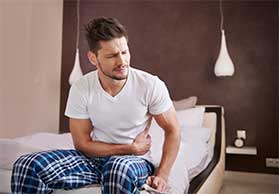Diverticulitis Treatment in Beverly Hills, CA

Diverticulosis is a condition where diverticula—abnormal pea-sized pockets or protrusions—develop in the lining of your digestive tract, most commonly in the large intestine. Diverticula usually develop in response to straining and are most likely to occur in weakened sections of the colon lining. The condition is very common in adults over the age of 40 and the condition is typically benign.
When the pea-sized (or larger) diverticula become filled with trapped waste, they can become inflamed and infected. A less-common but more dangerous condition called diverticulitis then develops. Diverticulitis normally affects 20 percent of the population, but it is becoming more common in Western culture due to poor diet and lifestyle choices.
Depending on the severity of your symptoms, diverticulitis treatment may involve at-home therapies, surgery or even a hospital stay to treat complications that may arise. To schedule a consultation with a qualified healthcare provider in Beverly Hills that specializes in diverticulitis treatment, call (424) 365-1800 or contact Dr. Jeremy Fischer online.
Diverticulitis Symptoms
People with diverticulosis normally have no symptoms. It is not until diverticulitis develops—and the diverticula become inflamed and infected—that you may experience the following diverticulitis symptoms:
- Painful cramps
- Tenderness in the lower abdomen
- Bloating
- Constipation or diarrhea
- Nausea
- Chills
- Fever
Left untreated, diverticulitis—like many infectious conditions—can develop into a systemic body-wide infection leading to septic shock, which can be life-threatening. A tear in the lining of the colon can also occur, allowing waste to leak into your abdominal cavity, leading to the following complications:
- Abscesses, where infection occurs in closed-off, isolated sections of your colon or abdomen
- Peritonitis, where your abdominal cavity becomes painfully infected
- Intestinal obstructions, where you develop blockages in your intestine
Diverticulitis Diagnosis & Treatment Options
If you experience abdominal discomfort or any other diverticulitis symptom, your healthcare provider will perform a physical examination and interview you about your medical history (i.e., symptoms, pain, diet, bowel habits, and medications and supplements you take) to rule out other gastrointestinal conditions such as irritable bowel syndrome or stomach ulcers .
Your healthcare provider may order several tests to help diagnose diverticulitis, including an X-ray, CT scan or ultrasound. Blood tests and other testing—including a sigmoidoscopy, colonoscopy and/or a barium enema—may be used to identify whether you are experiencing infection and internal bleeding. For heavy bleeding, an angiography can be used to pinpoint the source of the bleeding.
Diverticulitis symptoms can sometimes be resolved by simply drinking copious amounts of water, avoiding trigger foods and eating a low-fiber diet, but antibiotics are often necessary to arrest the infection. If the infection does not respond to oral antibiotics and dietary modifications, hospitalization with IV antibiotics may be necessary. Emergency measures—including diverticulitis surgery—may be required in the event antibiotics are not effective or complications develop, like perforation, abscesses, peritonitis or rectal bleeding that cannot be arrested.
Diverticulitis Diet & Lifestyle Habits
On an ongoing basis—between bouts of diverticulitis—it is important to eat plenty of the right kinds of fiber, drink at least eight ounces of water a day and get regular exercise. This in turn can help facilitate regular bowel movements to prevent constipation and the straining that leads to the development of additional diverticula.
During flare-ups of diverticulitis, a low-fiber diverticulitis diet is recommended. However, because fiber is an important part of moving waste through your intestines and avoiding diverticulitis, you should consume fiber regularly when you are not in an inflamed or infectious condition. Fiber from sources like vegetables, fruit, bran, brown rice, beans and legumes are all recommended.
There is controversy about diverticulitis foods to avoid. In the past, healthcare providers recommended avoiding certain foods like nuts and seeds, corn and popcorn, because of the risk they would become trapped in the diverticula and lead to inflammation and infection. However, many studies have shown that seeds and nuts can be helpful in preventing diverticulitis and do not cause additional issues.
Regain Digestive Tract Health
Diverticulosis cannot be cured, nor can the potential for developing diverticulitis. For that reason, it is important you find help understanding the symptoms of diverticulitis and proactively avoiding flare-ups of your condition. Your healthcare professional can treat some of the extreme symptoms of diverticulitis and possible complications, but the best course of action is to avoid the foods which trigger your diverticulitis and maintain colon health and regularity.
Request more information about diverticulitis and your testing and treatment options today. Call (424) 365-1800 or contact Dr. Jeremy Fischer online.
Vitality Integrative Medicine
Address
4849 Van Nuys BlvdSuite 104
Sherman Oaks, CA 91403
(424) 365-1800
www.vitalityintegrative.com
Hours
Mon:
8:00 am - 6:00 pm
Tue:
8:00 am - 6:00 pm
Wed:
8:00 am - 6:00 pm
Thu:
8:00 am - 6:00 pm
Fri:
8:00 am - 6:00 pm
Sat:
8:00 am - 12:00 pm

